This is the script of the Rational Animations video linked above, with a few minor edits and additions. I really like how the animations came out in this one, so if you are curious follow the link. If you only care about the arguments you can just read. Most of the images here are taken from the video.
If you honestly seek truth, and if you decide to tell the truth, at some point, you will accept to appear cringe to the eyes of most people. Why is that? Simply because truth may be cringe means that at some point, you will encounter a truth that other people are disgusted by, and if you decide to tell it, you will be associated with cringe.
Is it a necessity for at least some truths to be cringe, though? If that was not the case, the laws of the scientific method and of rationality would prescribe to avoid disgusting hypotheses. But our best guess on how to approach truth is to ask reality itself, not our social norms.
Truth doesn’t seem to correlate much with cringe, especially if we consider truths that are difficult to attain. In fact, there is an exception for those truths that are necessary for survival: I expect those truths not to be cringe in basically every culture.
The picture looks more or less like this: truths necessary for survival are a subset of non-cringe statements, while other truths intersect with both cringe and non-cringe statements similarly.
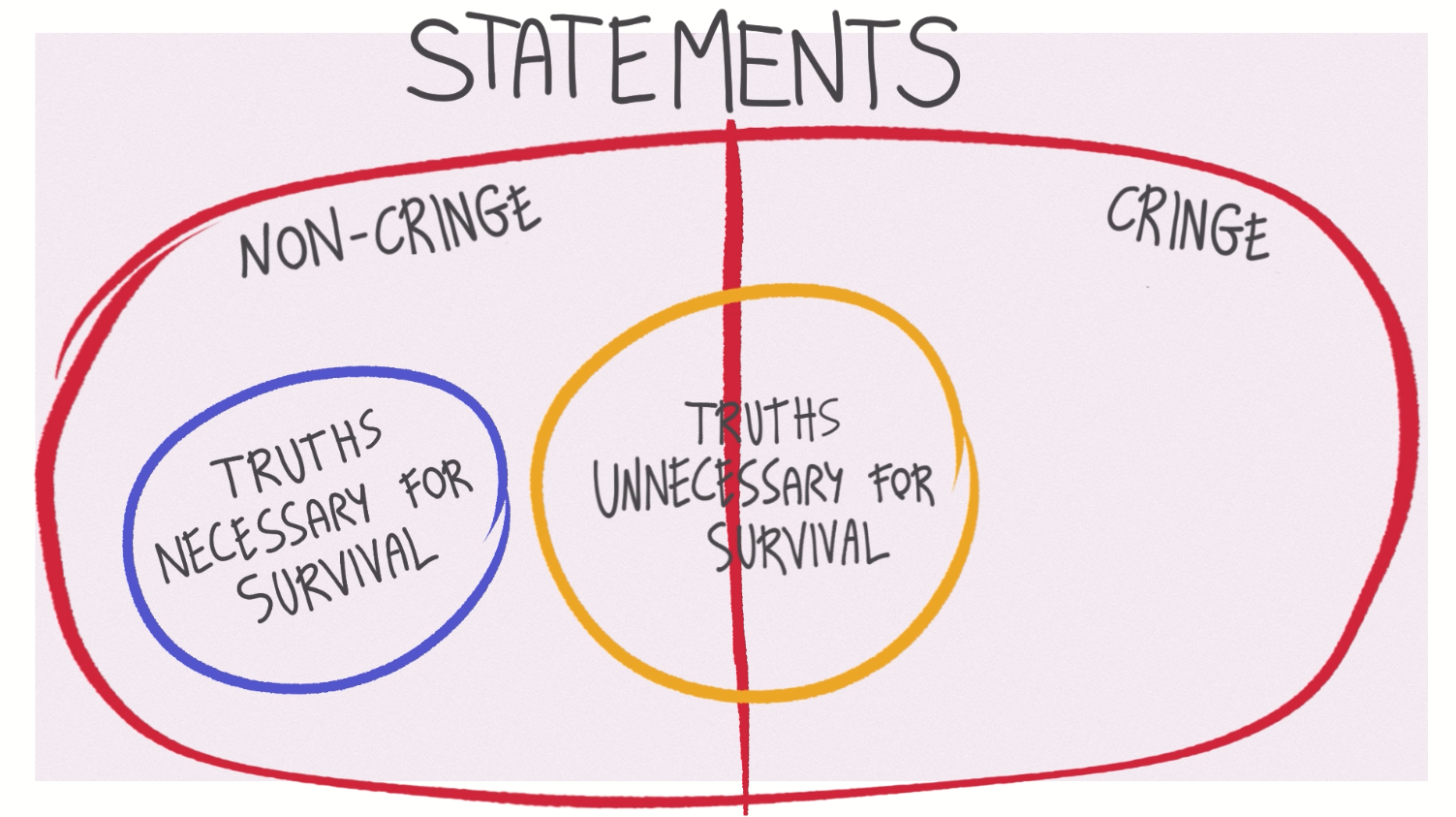
When seeking truth, you shouldn’t worry about if the truths you are discovering would be laughed at and scoffed at if said aloud. You would be like a swordsman who keeps glancing away to see if anyone might be laughing at him. Doing so makes you waste time, and it makes you move or withdraw for the wrong reasons.
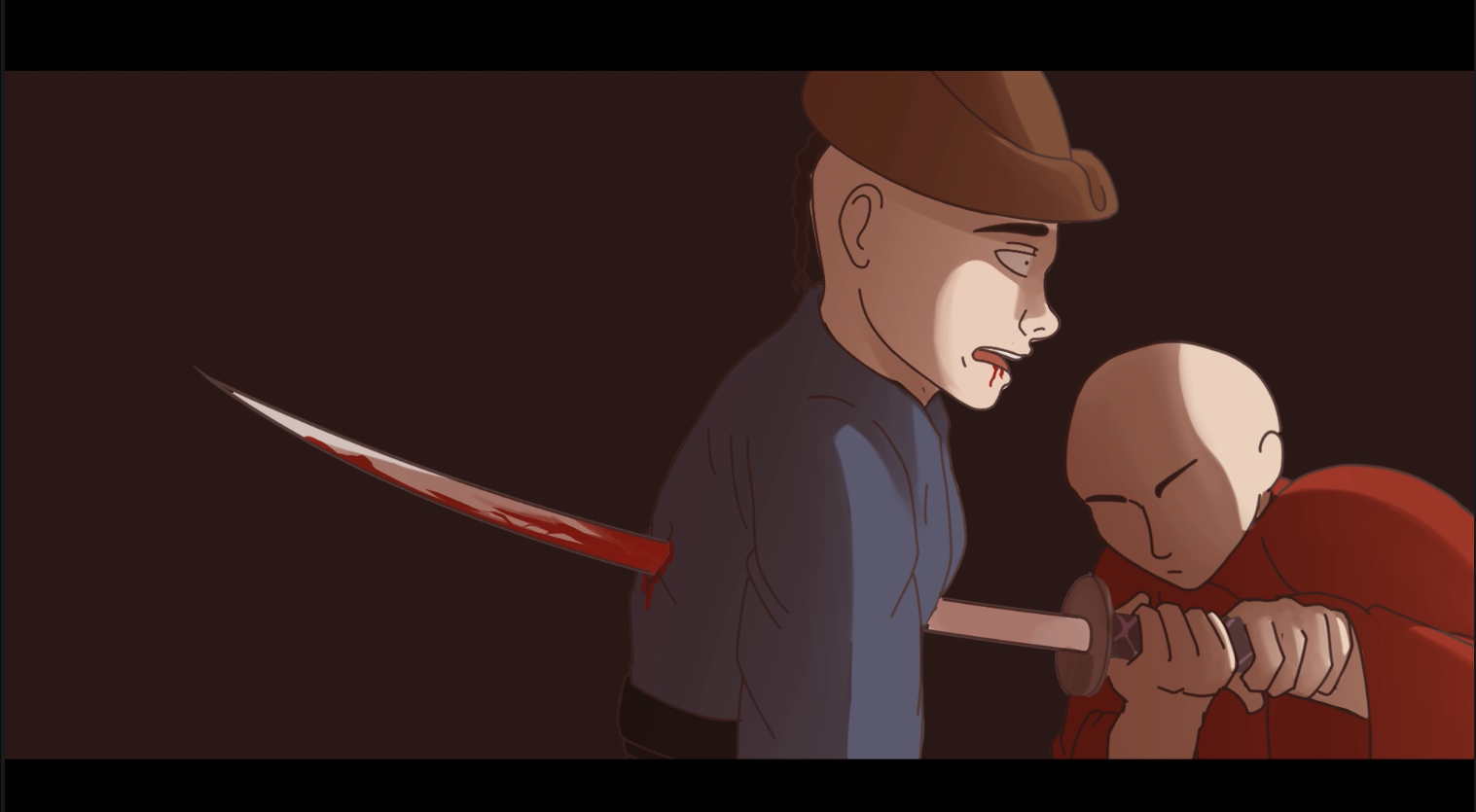
The acceptance of cringe is one of the marks of a truth seeker. Keeping this fact at the forefront of your mind is helpful for not straying from the truth.
The good news is that there are probably good ways to mitigate social repercussions without relinquishing truth-telling. For example, if you act and state your beliefs confidently, other people will usually see you in a more positive light. You act as if you were high… on your social hierarchy. And this confidence will positively affect the image other people will form about you. I’m not saying that this matters in any way to the actual truth, though. It just matters to people.
Being cringe doesn’t only happen when seeking truth but also when acting on your discoveries and pursuing your objectives. Seeking truth is often helpful to take the best course of action in life. If you forego a critical decision because you are afraid that other people will judge you, you will lose.
To appreciate how distant the feeling of “cringe” is from actual reality, you may observe when exactly people are cringing. It’s often the case that the rules of what is cringe and what is not change based on your level of physical attraction, net worth, social status, or how confidently you act. And none of these parameters have anything to do with the actual reality of what is true and what is convenient for you to pursue.
Different people may perform the same action for the same reasons, and yet they may be judged differently for entirely unrelated and superficial reasons.
Let’s observe a few concrete examples of this. It is not difficult because it’s [current year], and we have a whole culture based on scorn and cringe, which I have observed to be on the rise since at least 2013. The front page of Reddit sometimes says it all, with subs entirely for this purpose getting site-wide appreciation.
Let’s watch a few frames of the famous Filthy Frank’s song “I am a Weeaboo” [37M views...].

Are these people cringe because they are weeaboos? If you are answering yes, here more of them.

Now, these people have in common the fact that they are weeaboos, don’t they? But there is also another thing they have in common. Can you guess what it is?
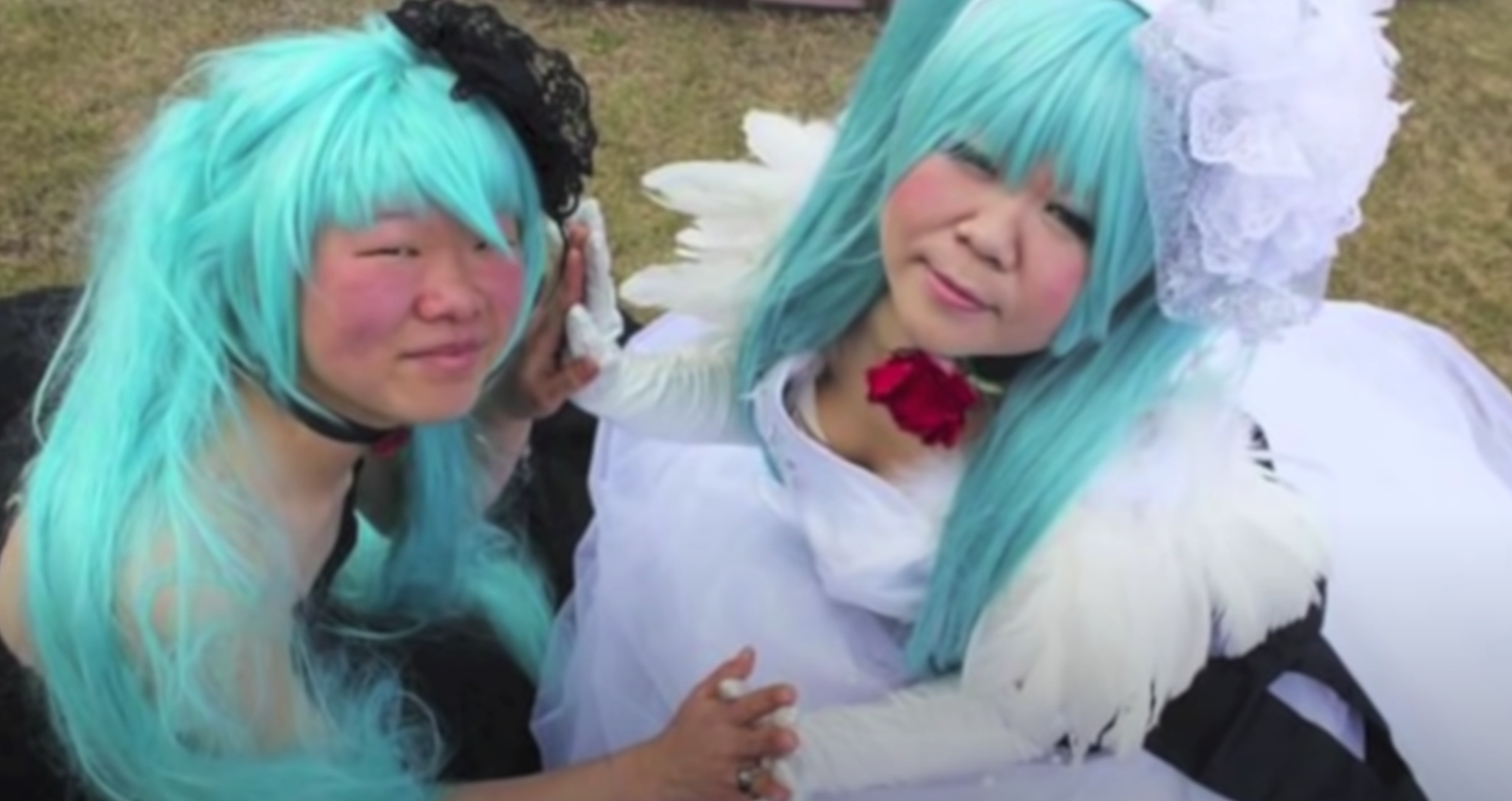
It is the fact that they are overweight and ugly according to societal standards. In the viewer’s mind, this alone makes these people at the bottom of their social hierarchy. And seeing someone at the bottom of a social hierarchy generates disgust. And disgust makes people want to create distance between themselves and the object of disgust. If the people in those images were prettier, there would be no disgust or secondhand embarrassment. In this case, the feeling of cringe comes from the unattractiveness, not from the weebness. Attractive girls or guys in cosplay do not get the scorn these people are getting. Nor Elon Musk, the most successful weeb in the world, gets it.
Actual weeaboos who partake in this culture of scorn will themselves call other weeaboos “cringe” because they have learned that weeaboos are cringe through socially manufactured pattern matching. They will want to put distance between themselves and other weeaboos to pretend they are higher in their social hierarchy. But all of this is so 2015; insulting weeaboos is passé now. The targets have changed in 2021. Now we have TikTok kids, for example.
Btw, here’s what happens if you go against the hive mind:
I just see people who are honestly pursuing their interests, and yet everyone bullies them. The stated reason is that they are weeaboos, but the real reason is good old ugliness.
The fact that being a weeaboo has been associated with cringe is something that only exists in social reality, and it doesn’t mean that you shouldn’t be a weeaboo. The affect heuristic and the halo effect are also relevant here. I have talked about them in a previous video. These effects are such that the ugliness spills over and makes people have a generally worse opinion of the ugly individual’s other characteristics. Therefore if you associate weeb with ugly and bottom of social hierarchy, weeb becomes automatically bad.
But what does all this weeaboo rant have to do with pursuing the truth? It’s simple. In this case, if you followed social norms, you would deny the truth about if you like anime or not, and you would pursue something else that would make you less happy. Don’t let other people decide for you what you like or what you do not like. What you like is a truth about your mind, and in principle, it is no different from truths about the world outside of it. Your mind is part of the world, after all, even if you have easier access to it than everyone else. Take this weeaboo thing as just an example. Remember it each time you are tempted to deny the reality of the world or of yourself because other people don’t like that reality or have associated it with things they do not like.
Cringe is based on disgust. You act on it because of social hierarchies. Acknowledge these feelings and then disregard them.
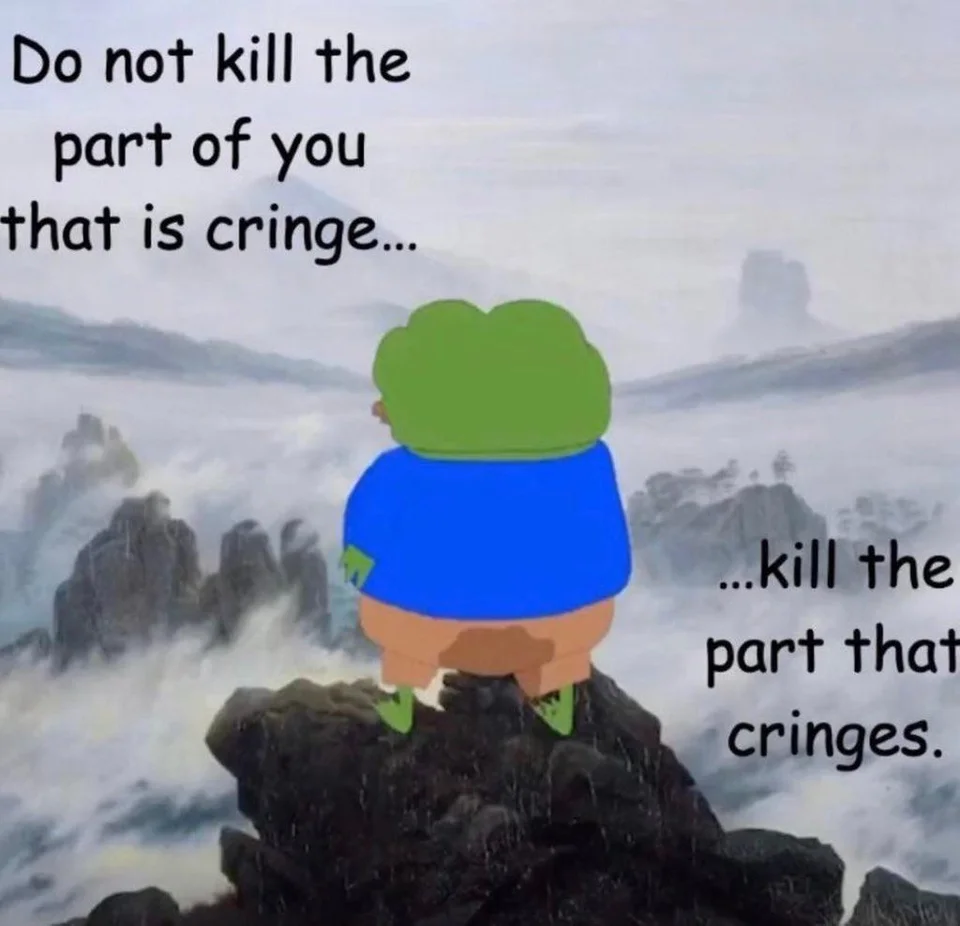
Social norms are built upon strata of lies that float above reality. If you really want the truth, you will only look at reality itself.
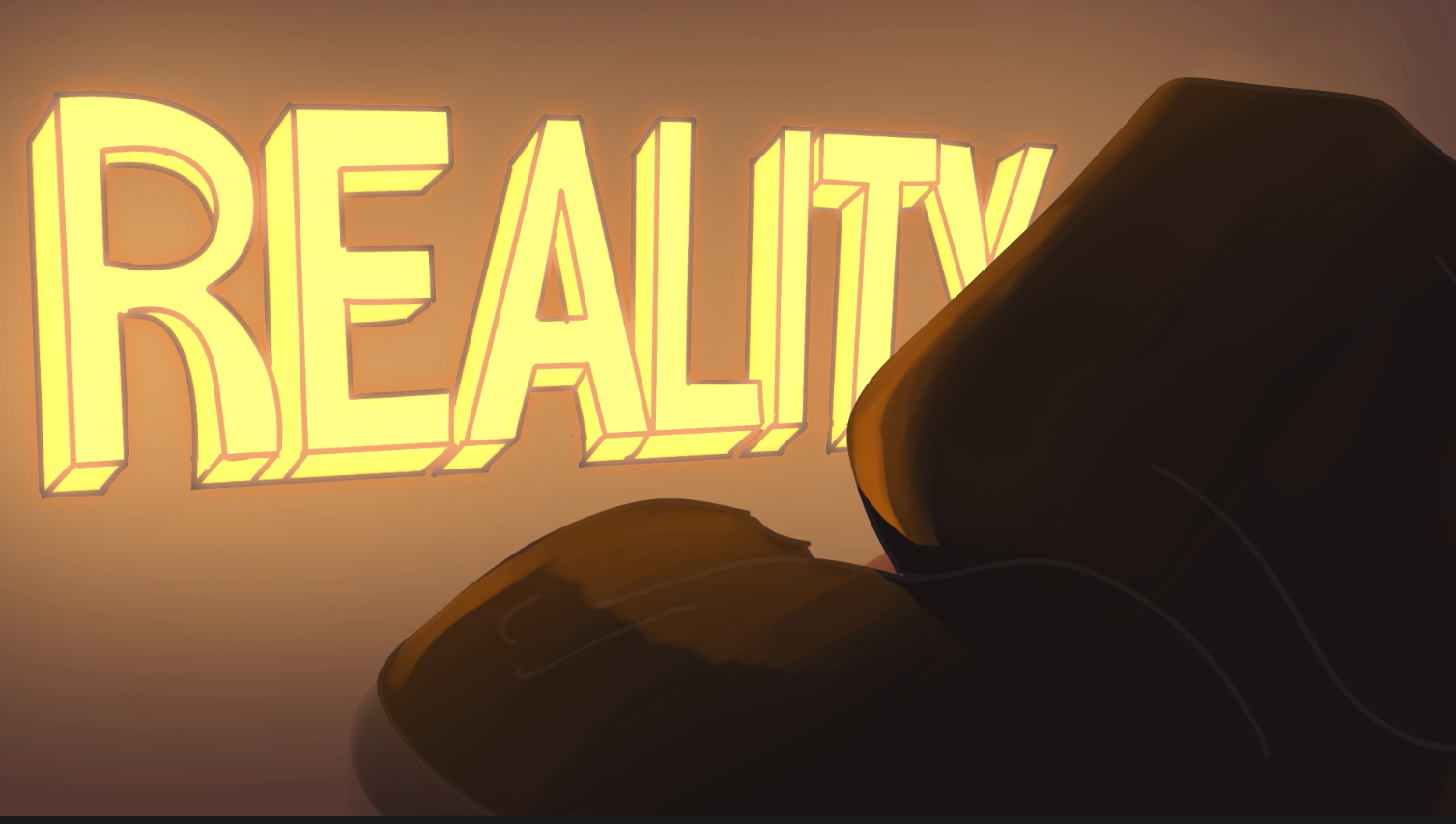
[I realized too late that the last phrase is exaggerated. Clearly, not all social norms are built upon lies, but the kinds I’m talking about here are.]
epistemic status: I’m more thinking out loud. I tried to put in a lot of “I think” and “perhaps” and question marks, but if I sound very confident in my phrasing, re-word it as more speculative.
I think this has a lot of truth behind it, but also I think it espouses a too all-encompassing view on the subject and wraps being true to yourself in a not-useful cloak of “seeking truths about reality”.
To more accurately support what I think you mean based upon the rest of your post, I think this could be more accurately stated:
“If you honestly seek truth, and if you decide to tell 100% of the truth you’ve found, and if you decide to tell 100% of the truth you’ve found to anyone you can, to become the leader of truth-tellers, to make telling the truth your reason for existence, to make Telling All Of The Truths your livelihood, then you will appear cringe to the eyes of most people”.
While true, it does not seem likely to me that this is a useful ideal to aspire to.
It seems likely to me that for most people, most of the time, a better ideal to aspire to is: you can honestly seek truth and yet decide to tell the truth judiciously, selectively (without a requirement of lies!) and thus appear non-cringeworthy to most people. (Probably cringe to some small subset.)
I think your definition of “reality” conveniently excludes the society we are embedded within, but the society we are embedded within is perhaps the most important part of the reality we need to navigate and influence to meet our goals.
Unfortunately, it seems like much of the rest of your points are built on this foundation.
I agree that when seeking truth you shouldn’t worry about what would happen if you said them aloud, but from the context...it does not seem that is actually the point of this post? It seems like the point of this post is more accurately captured in this re-phrased sentence:
“When speaking truth, you shouldn’t worry about if the truths you are revealing will be laughed at.”
As described above I do not think this is absolutely true.
You wouldn’t be like a swordsman who keeps glancing away to see if anyone might be laughing at him, you’d be like a swordsman weighing which stance to take. And/or building the muscle memory to let the correct stances and moves to “flow”. (Or something like that...I’m not a swordsman!)
There isn’t a swordsman here, and his opponent there, and other people over there...the other people and the opponent are all one.
Now, I would not argue that people should keep their mouths shut about things just to avoid appearing cringe. Maybe being weeaboo and posting it on the internet is just what you require for happiness. If so, get out and do that shit! However, be aware that you’re trading one useful thing for another useful thing and, unfortunately, sometimes you can’t have both useful things.
Acceptance and influence in society is not the be-all and end-all of goal fulfillment.
But it’s also not nothing.
I’ve thought about your comment, and I think you are basically correct about everything, but my personal experience differs on how easy it is to actually hide the truths you know (either about yourself or the external world).
From this paragraphs it seems like you make the case that you could say and do 90% of what you want to say and do and get away with it (remember that truth doesn’t only influence what you say, but also what you do, and that might be very difficult to hide). In my experience it was more like 20%. I guess it varies depending on who you are and the social context you are in.
I feel like that this applies to those truths that are absolutely impossible to say without alienating everyone. In real life you can get away with everything else by just being confident (I believe this with more or less 70% probability).
I actually didn’t want to define reality in this way. The distinction social reality vs. the rest of reality is useful in this context but clearly social reality is reality. I don’t know if social reality is “the most important part” (for some people it surely is, I don’t think it is for me), but it is definitely something that has value and factors in decisions. I may have been too extreme in my script and gave the wrong impression on a few points. My script wring skills have margin of improvement.
You are definitely correct here. It is not absolutely true. I think I have made the mistake of generalizing my experience too much.
Hmm. I think this highlights a key point. The word “want” is doing a lot of work here. I’m not sure I think you usually shouldn’t say what you want to say (unless you have some pathological version of want).
I believe things to be true about the world and myself that many people would probably, at minimum, disagree with, maybe even cause me social harm. The phrase “want to say” doesn’t capture my feelings about some portion of these things I believe. I’d be glad to share these thoughts if I thought others (or myself) would benefit from the sharing, but I do not have any want that would be satiated by telling people these thoughts.
That might not be a universal way of feeling, but I think what is universal is that by sharing cringey things, you are trading one good for another. That trade may or may not be a net gain for you. Not a thing I can judge!
Hadn’t thought of this before, but “cringe” seems pretty related to the rationalist notion of “ugh fields”.
I think that cringe is probably a particular case of ugh fields. Good catch.
Yeah, they seem similar, but “ugh fields” are more individual, while “cringe” is more social.
According to my intuitions about cringiness, it’s more about how people say things than what they say. E.g., discussions on inter-group differences in IQ are frequently really cringy when they happen on some culture war subreddit, but they can be fine (to my ears) when it’s Sam Harris talking to a guest on his podcast.
I guess you might reply that this effect is just: Sam Harris has a professional podcast and is already established, whereas redditors will seem like social outcasts when they discuss the same ideas? But I don’t think that’s what’s going on. I feel like it’s mostly the way a topic is addressed (framed, put into appropriate context, interpreted), and if I took the time I could point out various reasons why I think the reddit discussions are cringy. (Here’s a list of things to get started.)
I’d say you can always say true and important things without sounding cringy! (According to my cringingness intuitions, that is.)
When it comes to persuing the truth about what makes you happy, just observing that it’s sometimes fun to watch anime, is not really strongly about truth persuit.
The way do persue truth would be to actually start measuring how happy various activities in which you engage make you build models of what makes you happy and act according to those models.
I think of this quote from Nietzsche
“The more abstract the truth you wish to teach, the more you need to seduce the senses to it.”
I empathize with what you’re saying here because I miss the culture that existed in the world prior to, say, 2010 where some people evaluated claims based on merit rather than sexiness or virality on social media or whatever. The kind of pre-cringe world when ‘cringe’ wasn’t a one word counter argument to something unpleasant.
I think we should focus on keeping islands of merit-based argumentation alive, but recognize that communicating it to a wider audience requires some “seduction of the senses”—as Fred put it.
(will pledge to respond to this comment for two weeks with an option to renew).
Why would this happen rather than “you would be pushed into experiences and thought patterns that resolve the highly path-dependent determination of which things you enjoy in a way that makes it smoother for you to bond with the social groups around you”? Here I’m not asserting that the “deny” form is (generally) false, only that it doesn’t seem clearly true. Experiential evidence suggests that there’s a wide gradient, and indeed that alief-preconceptions about how much of one’s identity is social themselves skew the gradient a lot.
Or Cringe ⇒ Unattractiveness, or they have a common cause. The people in the video may be unattractive because the author wanted to convince the viewer that weeabooism correlates with low social status. When you listen to the linked song, the reasoning it brings forward for why the viewer should consider weeaboos cringe is that they believe to have higher social status than they do.
I think it’s possible to say in a somewhat sarcastic fashion, that when Galileo proposed the idea that the Sun was actually at the center of the solar system and that the Earth orbited around it, he was cringe. At the time, making pronouncements that went contrary to the Churches stated beliefs by anyone was considered cringe. He was deprived of his freedom until he recanted his theory, and so fell in line with the accepted ‘truth’ of mainstream society, thereby (somewhat) having his reputation and social status restored (but not.)
I’m a firm believer that there are “ugly truths”, “beautiful truths”, and “inconvenient truths” among others, and you are more than likely going to find more social status by discovering and proselytizing for “beautiful truths” than the other 2; find more sympathy and support for discovering and sharing “inconvenient truths” than “ugly” ones; and potentially be stigmatized and ostracized for discovering and insisting people see the “ugly truths.”
Of course these are all fads in typical human form; yesterday’s beautiful discovery of atomic science and all the scientific benefits thereof, as well as the codification of the modern and efficient “Nuclear Family” Model and suburban sprawl, becomes today’s terror of Nuclear Weapons, Radiation induced Zombification, the overflowing Nursing and Retirement home system where Moms and Dads have hidden their parents away for decades after abandoning inter-generational households, and the plethora of abandoned suburbs, strip malls and roadways as the younger generations attempt to move back to ‘revitalized’ inner cities through gentrification.
This makes me wonder what horrific unintended consequences will come about tomorrow because of the Quantum age we’ve entered. I’m steady trying to figure out how Quantum science will destroy humanity, what the “Quantum Family” Model looks like, and how it’ll screw up society even more, and how quantum understandings will negatively affect city planning for the foreseeable future. What I see is an interrelated series of “ugly truths” about societies inability to learn from our past mistakes.
So do I step into cringe and tell the truth I see there, hoping that people will see my contributions as valuable, and therefore raise my social (financial status), or do I let someone else do it, someone with more social status to start with so that they can do it in a more ‘socially acceptable’ way, and thereby devalue my own social status by passing up an opportunity to point to an issue and take a stab at trying to come up with solutions?
Truth is subjective—Beauty is in the eye of the beholder—When in Rome, do as the Romans do—But, Nero did fiddle...and I don’t want to be rearranging the deck chairs on the Titanic. Some people get to spend their lives surrounded by beautiful truths, and nothing but the purest gold falls from their lips whenever they speak. Some people spend their lives surrounded by ugly truths, and can’t speak of their lives for the gag in their mouths, and when they do pull it from their jaws, people run away screaming and clutching their ears after only a few words. The inconvenient truth is that people surrounded by beauty can only speak about beauty, and people surrounded by ugliness can only speak about ugliness, and most people would much rather hear about beauty.
I think that’s pretty cringe myself.